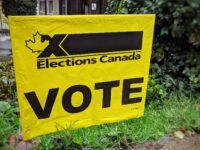It is election day in Canada following a late summer campaign in which the focus was largely anything but digital issues: COVID, climate change, Afghanistan, and affordability all dominated the daily talking points. The digital policy issues that grabbed attention throughout the spring – Bill C-10, online harms, wireless pricing – were largely absent from the discussion and in some cases even from party platforms. Laura Tribe, the executive director of OpenMedia, joins the Law Bytes podcast to discuss digital policies and the 2021 election campaign. Our conversation walks through a wide range of issues, including the surprising omission of wireless pricing from the Liberal platform, the future of Bill C-10, and the failure of privacy reform to garner much political traction.
Post Tagged with: "election"
Why Universal, Affordable Internet Access Should be 2015 Election Campaign Issue
The long election campaign of 2015 has featured a myriad of daily policy announcements as the three largest political parties vie for attention and votes. From targeted tax cuts to new spending promises, political leaders have focused on education, child care, defence, the environment and more. Yet thus far largely missing from the campaign has been the most fundamental digital issue – universal, affordable broadband Internet access.
My weekly technology law column (Toronto Star version, homepage version) notes that the Conservatives pointed to their spending on broadband in August when few were paying much attention, but that policy has done little to stem Canada’s steady slide in the global broadband rankings which indicate that Canadian Internet services are middling at best when compared to other developed countries. The opposition parties have said even less, failing to take advantage of consumer frustration by unveiling innovative policies that might address the issue.
The TPP End Game and the Canadian Election
Negotiations aimed at concluding the Trans Pacific Partnership are underway in Atlanta with plenty of signs that the various countries are prepared to compromise in order to reach a deal when the ministers (including Canadian International Trade Minister Ed Fast) arrive toward the end of the week. Canada has already caved on most intellectual property issues (copyright term, etc.) and Prime Minister Harper recently signaled Canada’s willingness to cave on the issues related to the auto sector and the dairy industry. Meanwhile, Japan is said to be ready to compromise on rice and there is a proposal on biologics that may not change much, but could be enough to garner support from some Asian countries.
While I think there remain questions about whether a caretaker government can/should be committing to such significant changes (the New Zealand Minister of Trade noted that Canada is negotiating as if there is no election underway), the TPP is clearly viewed as a major political prize by the Conservatives in the midst of an election campaign. The usual suspects (Chamber of Commerce, Council of Chief Executives, etc.) presumably have their press releases and quotations of support for a done deal already submitted and even opponents in the auto sector are reportedly afraid to criticize the government.
Why Internet Privacy Should be a Key Election Issue
Canada’s controversial anti-terrorism bill, Bill C-51, has emerged as a key talking point in the current election campaign. Pointing to its big implications for privacy and surveillance, the NDP sees political opportunity by emphasizing its opposition to the bill, while the Liberals have been forced to defend their decision to support it (but call for amendments if elected). The Conservatives unsurprisingly view the bill as evidence of their commitment to national security and have even floated the possibility of additional anti-terror measures.
While Bill C-51 now represents a legislative shorthand for the parties positions on privacy and surveillance, a potentially bigger privacy issue merits closer attention.
My weekly technology law column (Toronto Star version, homepage version) notes that last year, the government concluded more than a decade of debate over “lawful access” legislation by enacting a bill that provided new law enforcement powers for access to Internet and telecom data. The bill came just as reports revealed that telecom providers faced more than a million requests for such information each year and the Supreme Court of Canada issued its landmark Spencer decision, which ruled that Canadians have a reasonable expectation of privacy in their basic subscriber information, including name, address, and IP address.
Canadian Government Amends “Caretaker Rules” To Give Itself Power to Continue Negotiating TPP
This past weekend was a busy one politically as Canada was launched into a lengthy election campaign just as countries negotiating the latest round of Trans Pacific Partnership negotiations in Hawaii failed to conclude a deal. With reports that there may be a follow-up ministerial meeting within weeks, Canadian officials have been quick to claim that the election campaign will not interfere with the TPP trade talks.
To support the claim that the government is permitted to continue negotiating even when it is a “caretaker” government, the Privy Council Office yesterday released a document titled Guidelines on the Conduct of Ministers, Ministers of State, Exempt Staff and Public Servants During an Election. In previous elections, this document was not publicly released, leading Liberal MP Ted Hsu to table a motion in 2011 calling for its availability and to recent op-eds raising the same concern.
Why the sudden change of heart? Perhaps it has something to do with the desire to release this paragraph:











